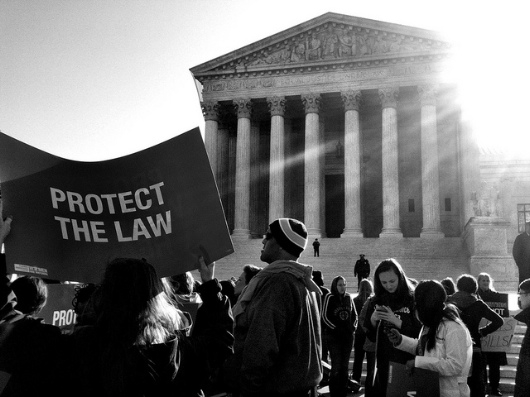Why White Evangelicals Are Wrong About Obamacare
Editor's Note: This essay responds to the "Three Reasons White Evangelicals Hate Obamacare" critically analyzed by Myriam Renaud in her April 12 article for Sightings.It is reasonable to think that the Patient Protection and Affordable Care Act (ACA) is a direct descendant of our social contract and human rights constructs
 Editor's Note: This essay responds to the "Three Reasons White Evangelicals Hate Obamacare" critically analyzed by Myriam Renaud in her April 12 article for Sightings.
Editor's Note: This essay responds to the "Three Reasons White Evangelicals Hate Obamacare" critically analyzed by Myriam Renaud in her April 12 article for Sightings.
It is reasonable to think that the Patient Protection and Affordable Care Act (ACA) is a direct descendant of our social contract and human rights constructs. As such it shares inherently in their reasonableness and merits the respect we accord things reasonable.
The enactment in 2010 of the ACA was Congress’s attempt to make available to some 40 million people in the United States the means to purchase medical insurance, without which there is very little access to health care. Since poverty is a major barrier to having insurance, it makes access to health care even more remote. Prior to the ACA’s major provisions coming into force in 2014, more than 30% of Americans at or below the poverty level had no medical insurance. Gender also correlates with a lack of medical insurance. About 17% of men, for example, were without insurance. Add poverty and the figure doubles. A similar pattern is evident for age, race, and education, among other factors. Without insurance, people included in certain demographics would have had no regular access to medical services and would have had to forego necessary care.
If that should concern us, consider too that uninsured adults were at a 25% higher risk of dying than insured adults. To support health care for the uninsured, federal, state, and local governments and charitable institutions were providing substantial funds. But compared to the medical services enjoyed by those insured, those available to the uninsured were inferior in quality and outcomes. The necessity of insurance universally available forces us to recognize that providing it is a societal enterprise. The individual cannot secure it, and neither can private insurance. Indeed, only a public, single-payer system could provide insurance as broadly and efficiently as is needed.
Clearly, not having medical insurance places one’s receiving medical services at serious risk. How tolerable that risk depends on the importance of medical care, which is indispensable if the health we are born with is to be maintained and improved. Since that health is constitutive of the life of each individual, it is reasonable to consider medical care as a necessary condition of health—a human right.
As a human right, medical care is the object of a claim of right, distinct from privilege, favor, or permission. Further, it is a human right because it is claimed equally by all humans and against all humans. Consequently, to deny it is to cause injustice because to do so would deny what is necessary for the possibility of a life well lived as a human being. Ultimately, the right to health care is equivalent to the inalienable right to be treated as a person. To deny the one is to violate the other.
Such other-regarding behavior is a matter of moral consequence best appreciated in relation to the social contract. As persons, our moral or other-regarding obligations call for a compact of reciprocal self-interests legitimately instituted in society to secure a relation between public policies like health care and the rights of members of society. The upshot is that rights, particularly human rights, are of overriding importance for society, functioning as the needle of its moral compass. Mutual in nature, rights—although located in and exercised by individuals—result in a recognition of essential interests held in common and depending for their realization on societal solidarity. In other words, human rights are dependent on society, not for their origination but their realization. In turn, society depends on human rights to justify its role.
An attack on the ACA, given its purpose, is an attack on both human rights and the social contract, meriting, as a result, very considerable skepticism. For reasons based on biblical exegesis, white evangelicals have mounted just such an attack on the grounds that government functions to protect its citizens, not care for the sick. As long as it is only pursuing the former function, we are enjoined in the words of 1 Peter 2:13-14 to be submissive to every ordinance of man as though to God. Since on the face of it there is nothing here that could not be used to defend the ACA, it demonstrates the absurdity of taking language written from the wellspring of religious belief and applying it as though written from the wellspring of reason, governed in its use by the laws of logic and the imperative of truth to fact.
This is not to suggest that belief as a human behavior is not reasonable. Unlike knowledge it does not, however, require the condition of truth. Asked, “How far down is the office with the red door?” one might reply, “I believe it is the fourth one down.” Proceeding on and ascertaining that it is, in fact, the fourth down, I would no longer say, “I believe,” because now I would have to say, “I know.” Truth is independent of the evidence, not so our knowledge of the truth.
The language of religious belief may be used to inform a believer’s attitudes toward the ACA. However, in doing so it must not incur a logical category mistake by combining two terms conceptually distinct. For example, it is argued, on the basis of 1 Corinthians 7:23, that since the coercion in the ACA is bondage under sin, the ACA must be repudiated. This combination is not just false; it is nonsensical. It assesses the ACA in terms of divine redemption, which is quite irrelevant to public policy for health care. Understood as honoring human rights and fulfilling the social contract, the ACA merely confirms a prior obligation, as a matter of justice, to purchase medical insurance, thereby generating the sufficient number of ACA enrollees necessary for a distribution of risk that results in affordable care for all.
Insisting instead—as the religious right does—on an irrelevant biblical exegesis to discredit the ACA is intellectually dishonest, debases religious belief, and damages rational conversation in the public square. “A man may be a heretic in the truth; and if he believe things only because his pastor says so, or the assembly so determine, without knowing other reason, though his belief be true, yet the very truth he holds becomes his heresy” (John Milton, Areopagitica).
Resources
- Gewirth, A. The Community of Rights. Chicago: University of Chicago Press, 1996.
- Green, T. F. The Activities of Teaching. New York: McGraw-Hill, 1971.
- Hurley, J. “Ethics, economics, and public financing of health care.” Journal of Medical Ethics, Vol. 27, No. 4 (August 2001): 234-239.
- Milton, J. Areopagitica. Quoted in W. K. Clifford, The Ethics of Belief and Other Essays. Amherst, N.Y.: Prometheus Books, 1999.
- Morris, H. “Persons and Punishment.” In A. I. Melden, ed., Human Rights. Belmont, Calif.: Wadsworth Publishing Co., 1970.
- Trotochaud, K. “Ethical issues and access to healthcare.” Journal of Infusion Nursing, Vol. 29, No. 3 (May/June 2006): 165-170.
- Wasserstrom, R. “Rights, Human Rights and Racial Discrimination.” In A. I. Melden, ed., Human Rights. Belmont, Calif.: Wadsworth Publishing Co., 1970.
Image: Rally in support of the Affordable Care Act in front of the U.S. Supreme Court in Washington, D.C., March 27, 2012 | Photo Credit: LaDawna Howard/Flickr (cc)
 Author, T. Patrick Hill (PhD’02), is associate professor in the Edward J. Bloustein School of Planning and Public Policy at Rutgers University, where he teaches courses in ethics and law as well as in thinking. His current area of research is ethics and the technology of gene editing, with a specific focus on the CRISPR-Cas9 technology. Author, T. Patrick Hill (PhD’02), is associate professor in the Edward J. Bloustein School of Planning and Public Policy at Rutgers University, where he teaches courses in ethics and law as well as in thinking. His current area of research is ethics and the technology of gene editing, with a specific focus on the CRISPR-Cas9 technology. |
Sightings is edited by Brett Colasacco (AB’07, MDiv’10), a PhD candidate in Religion, Literature, and Visual Culture at the University of Chicago Divinity School. Sign up here to receive Sightings via email. You can also follow us on Facebook and Twitter.


